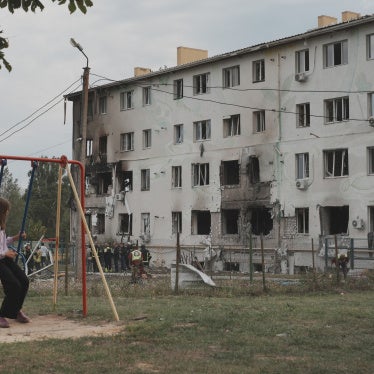Yesterday Uzbek police confiscated reports published by the U.S.-based group Human Rights Watch. Police at the Syrdarya regional court took the reports from a Human Rights Watch representative who is monitoring the trial of twelve men charged with membership in Hizb-ut-Takhrir, a peaceful Muslim organization which is banned in Uzbekistan.
Police confiscated six copies of the Uzbekistan chapter of the Human Rights Watch World Report, the international monitoring organization's annual global survey of human rights conditions. The World Report is a public document published by the organization in December 1999 and distributed widely around the world. The presiding judge at the trial, Sobir Tulkushev, characterized the distribution of the world report chapter as the "the clandestine distribution of leaflets." He also warned the group to stop providing its materials to "the relatives of criminals." On March 6, police threatened family members of the defendants not talk to the human rights group "or else it will be worse for your sons." Court officials also announced that the police presence in and around the court had been stepped up because Human Rights Watch had distributed materials near the court house.
"This is harassment, pure and simple. Human Rights Watch is in Uzbekistan to monitor and report on human rights abuses; we operate openly and there is nothing clandestine about our publications or the way we work," said Holly Cartner, executive director of the Europe and Central Asia division of Human Rights Watch. "Uzbek officials know this perfectly well. The international community needs to remind them of their obligation to respect free expression."
The confiscation of the organization's materials follow routine police harassment of Tashkent-based staff members. On February 28, 2000, Tashkent police summoned a Human Rights Watch staff member for interrogation, allegedly because they had detained a man who had one of the organization's business cards in his pocket.
Human Rights Watch established an office in Uzbekistan in 1996 and is registered with both the Ministry of Foreign Affairs and the Ministry of Justice. The Uzbek government's reputation with the international community has benefited from its perceived tolerance of the international rights group. Officials frequently point to the group's presence in the country as a evidence of civil society, even as authorities crack down heavily on local rights defenders.
Yet recently, the government of Uzbekistan has grown increasingly hostile to international human rights monitoring. Beginning in October 1999, Human Rights Watch was barred from monitoring ten separate trial hearings, despite the government's repeated declarations that trials would be open to the public.
Throughout the summer, the government led a campaign of arrests and harassment against local rights defenders. In 1999, two members of the Independent Human Rights Organization of Uzbekistan, Ismoil Adylov and Mahbuba Kasymova, were convicted and sentenced to five-and-six-year prison terms on politically motivated and wholly spurious charges. Other rights defenders have been detained, beaten, harassed and subjected to intense surveillance by law enforcement officers.







